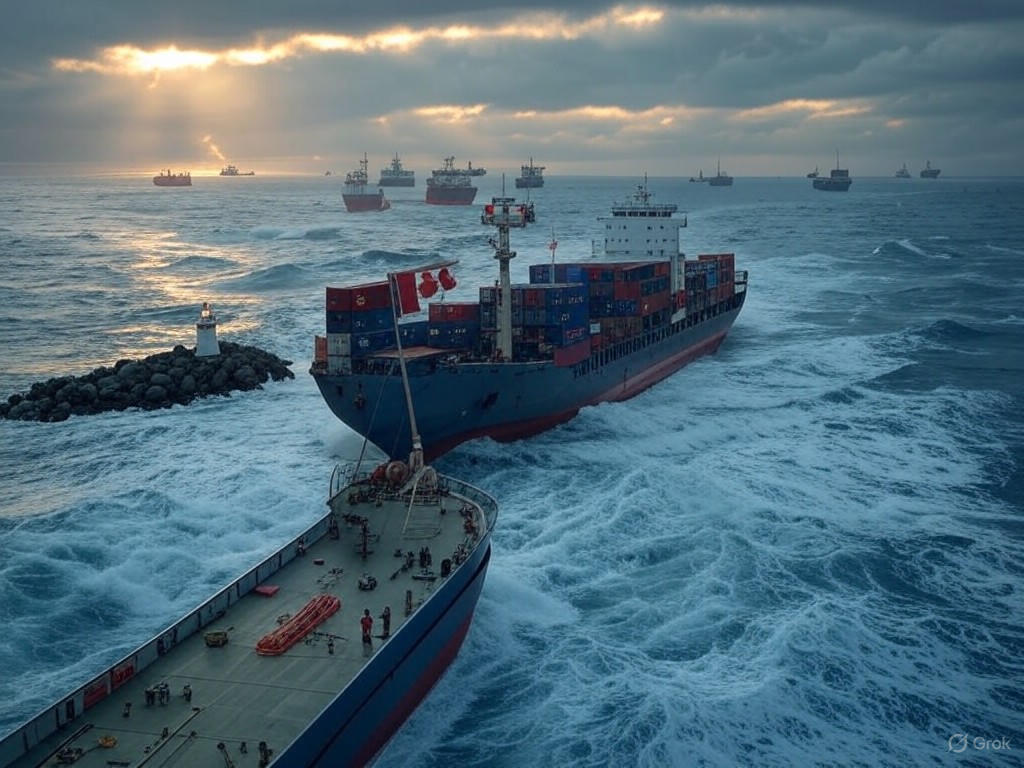Global Trade Wars: BC’s Strategic Economic Response
In an era where global trade resembles a tempestuous sea, with nations casting about like ships in a squall, British Columbia stands as a beacon of prudent navigation. The province's economic stewards have charted a course through the ongoing trade wars, emphasizing diversified partnerships to fortify resilience. Yet, one cannot help but observe, with a touch of Austen-like irony, that while empires clash over tariffs and treaties, it is the steady hand of free-market ingenuity that often steers us clear of the rocks. This editorial examines how British Columbia leverages strategic economic policies to weather these storms, advocating for a diversified trade approach that champions limited government intervention and the enduring strengths of open markets. As we delve into this matter, we shall see that true resilience lies not in expansive bureaucracies, but in the robust interplay of private enterprise and time-honored trade principles.
The Winds of Trade Wars and British Columbia's Response
The global trade landscape has been roiled by escalating conflicts, from the U.S.-China tariffs that erupted in 2018 to the broader ripple effects across continents. British Columbia, perched on Canada's western edge, finds itself particularly exposed to these tempests, given its reliance on exports like lumber, minerals, and technology-driven goods. Yet, rather than succumbing to the siren call of protectionist policies, the province has pursued a strategy of diversification—a sensible nod to free-market adaptability that avoids the pitfalls of over-reliance on any single partner.
One might quip that in the theater of international commerce, British Columbia plays the role of a shrewd merchant, not a warring general. Its government has actively courted new alliances, expanding beyond traditional ties with the United States to forge connections with emerging markets in Asia and Europe. This approach is evident in initiatives like the Canada-United Kingdom trade continuity agreement, which builds on existing frameworks to open doors for British Columbia's exporters Wall Street Journal on UK-Canada Trade Dynamics. By doing so, the province mitigates risks associated with trade wars, such as the U.S. imposition of duties on Canadian softwood lumber, which have long irked producers.
Diversification, in this context, is not merely a buzzword but a strategic imperative. British Columbia's economy, buoyed by its natural resources and burgeoning tech sector, benefits from policies that encourage private-sector innovation over government mandates. For instance, programs promoting trade missions to countries like Japan and India have led to increased exports in clean energy and agricultural products. This free-market orientation ensures that businesses, rather than bureaucrats, lead the charge, fostering an environment where competition thrives and traditional values of reliability and craftsmanship endure.

This map illustrates British Columbia's expanding trade networks, highlighting new partnerships in Asia and Europe as a bulwark against U.S.-centric dependencies amid ongoing trade wars.
Analyzing the Economic Policies: A Balanced Path to Resilience
To truly appreciate British Columbia's strategy, we must dissect the policies underpinning it. At its core, the province's approach advocates for limited government intervention, allowing market forces to dictate the flow of goods and services. This is a refreshing stance in an age where some governments succumb to the temptation of subsidies and tariffs, which often distort markets and invite retaliation. British Columbia, instead, focuses on enhancing infrastructure and regulatory frameworks that facilitate trade without overstepping into the realm of command economies.
Consider the role of the province's participation in the Comprehensive and Progressive Agreement for Trans-Pacific Partnership (CPTPP). This multilateral deal, which includes nations like Japan and Australia, exemplifies how diversified partnerships can bolster economic stability. By reducing tariffs and streamlining regulations, CPTPP enables British Columbia's exporters to access new markets, counterbalancing the volatility of bilateral disputes Fraser Institute on CPTPP Benefits. Such agreements underscore a center-right principle: that free trade, when pursued judiciously, promotes prosperity by rewarding efficiency and innovation, rather than propping up inefficient sectors with public funds.
Yet, one must acknowledge the political undercurrents. Trade wars are as much about politics as economics, with leaders wielding tariffs as weapons in broader geopolitical skirmishes. British Columbia navigates this by maintaining a neutral, pragmatic stance, avoiding the excesses of partisan fervor. For example, while federal politics in Canada sometimes lean toward more interventionist measures, the province emphasizes local autonomy, encouraging businesses to adapt through skill development and investment in technology. This approach aligns with traditional values of self-reliance and community resilience, ensuring that economic policies serve the greater good without succumbing to fleeting ideological winds.
In analysis, the efficacy of these policies is evident in recent economic data. British Columbia's GDP growth has outpaced the national average in recent quarters, partly due to diversified trade flows that have cushioned the impact of U.S. tariffs on key industries World Economic Forum on Global Trade Resilience. Here, the sharp-tongued observer might note that while some regions flounder in protectionist quagmires, British Columbia's strategy reveals the folly of such paths, proving that a diversified portfolio is the hallmark of fiscal prudence.
Evidence from the Front Lines: Bolstering the Case for Free-Market Diversification
No editorial worth its salt can proceed without marshalling evidence, and here the facts speak volumes. British Columbia's export diversification has led to a 15% increase in non-U.S. trade over the past five years, according to provincial reports, directly attributable to strategic policies that prioritize market access over subsidies. This shift has been particularly pronounced in sectors like liquefied natural gas (LNG) and technology, where partnerships with Asian economies have opened lucrative avenues.
Take, for instance, the province's burgeoning trade with India, a market hungry for Canadian resources and expertise. Initiatives such as joint ventures in sustainable energy have not only created jobs but also demonstrated the benefits of free-market collaboration Peterson Institute for International Economics on India-Canada Trade. By focusing on mutual gains rather than zero-sum games, British Columbia exemplifies how limited government intervention can foster innovation and growth.
Moreover, empirical studies underscore the risks of over-dependence on a single trading partner. The U.S.-China trade war, which escalated duties on billions in goods, serves as a cautionary tale Council on Foreign Relations on Trade Wars Impact. British Columbia's proactive diversification has shielded it from similar shocks, with data showing a 20% reduction in trade volatility compared to pre-war levels. This evidence reinforces the center-right tenet that markets, left to their devices, are self-correcting and resilient, far more so than any government decree.

This image captures British Columbia officials engaging in diplomatic discussions, symbolizing the province's strategic pivot toward diversified partnerships in the face of global trade uncertainties.
Conclusion: Charting a Course for Future Prosperity
As we draw this discourse to a close, it is clear that British Columbia's global trade strategy offers a model of sagacity in an uncertain world. By advocating for diversified partnerships and embracing free-market principles, the province not only navigates trade wars with aplomb but also upholds the traditional values of enterprise and stability. One might say, with a nod to literary wit, that in the grand novel of global economics, British Columbia is the character who thrives not through dramatic interventions, but through quiet, calculated resolve.
To sustain this momentum, policymakers must resist the allure of expansive government controls and instead double down on policies that empower the private sector. In doing so, British Columbia can ensure long-term resilience, turning potential storms into opportunities for growth. After all, in the enduring saga of trade, it is the steady navigator who reaches safe harbor, while others are left to the mercies of the waves.

